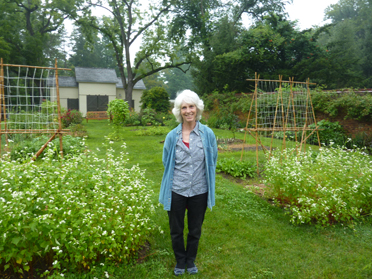ALL IN A DAY’S WORK: Pam Ruch At Morven

Pam Ruch might be a horticulturist but Morven Museum and Garden staffers think of her as a “superstar.” For more than 10 years, she’s been taking care of the gardens and guiding a team of dedicated volunteers. So it might come as a surprise to those who know Pam’s classes on nature journaling or her regular “Helping Gardeners Grow” blog to discover that prior to exercising her considerable talents in the outdoors, she worked for many years indoors doing tax preparation. Now that she has found her natural niche, she has been spreading the word about organic gardening through writings in magazines, newspapers, and via radio interviews. Here, she talks about her work in her own words.
—Linda Arntzenius
“I grew up in the Philadelphia suburb of Berwyn and I definitely did not get my love of gardening from my parents. My father was a mechanical engineer working for a pharmaceutical company. My mother was a scientist with a master’s degree in bacteriology. I was one of seven and I set out to be an artist, attending the Tyler School of Art. I did watercolors for a time but eventually I got disillusioned about making something that I then had to find a place for. Gardening satisfies my creative impulse. The work I do now is exciting and, at times, challenging.
I’ve always been interested in gardening but I never thought it would become my career. When I was 40, I went back to school to become a horticulturist. It was my goal to get my degree by the age of 50, which I did. [Editor’s Note: she graduated summa cum laude from Temple University in 2000] Then, a couple of years ago, I took an online master’s in environmental science at Green Mountain College, Vermont. The program emphasized writing and I discovered field journaling which brings art, science, and horticulture together. With that, I found my mission, a way of helping people care about and delve into the environment.
Field Journaling
Field or nature journaling is about recovering the outdoor experience, about exploration and observation. Journals can include drawing, data, prose, poetry. The practice deepens your relationship with nature. In my own journal, I’ve written about ants trying to take an earthworm underground, about violets having another underground flower. That’s their ace in the hole, so to speak, allowing them to propagate widely.
I love the details of nature and I would love to lead more people toward that kind of involvement. I find nature fascinating and fascination can be infectious.
When I graduated from Temple, the restoration of Morven was underway and I became the curator of landscape, overseeing the garden restoration, while also working at Organic Gardening magazine. Thursday is Morven’s volunteer day and I usually arrive around 9:30 a.m. Volunteers are a real treasure. We figure out what needs to be done, mostly propagation and weeding, and do it. The intern program that I set up with Isles has just ended. Many of the interns live in the city of Trenton and find nature to be a scary place with spiders and bees. At Morven we try to replace fear with fascination. Everything in nature has its place.
Because Morven is an historic landscape we are restricted with respect to plantings. The Colonial Revival Garden dates to Helen Hamilton Shields Stockton [1864-1949]. With no exact list of her plants, we asked the Nature Conservancy for advice. Period photographs helped identify plants and I did some reading, especially the work of the American landscape architect Ellen Shipman [1869–1950], to get a feel for what a gardener of the period would be thinking.
A garden isn’t a static thing and what we are aiming for is not an exact replica. Because of contemporary conditions and pests that wouldn’t be possible. But what we can do is capture the spirit of a Colonial Garden from the early part of the 20th century. That’s the challenge at Morven.
Understanding Nature
My blog is a way of writing for myself. If others enjoy it, so much the better. I also write web articles for the Home Garden Seed Association and grow vegetables for the farm-to-table restaurant at the Glasbern Inn in Fogelsville, Pa. When you understand how nature works you are in a better position to work with it. Right now we are having a lot of rain late in the growing season. We really need sunshine for the next three weeks to avoid blight. Because of the pathogens out there just waiting for such wet conditions, many farmers are growing tomatoes in cold frames to control the amount of water and maintain dry leaves.
I live my life differently from most. My security is in my skill set and I’m always looking to add new skills, to make sure I’m useful in multiple ways. That allays any anxieties about the future. I volunteered to write and edit Morven’s newsletter. It’s work that I find satisfying in the same way that tax preparation once was. It’s like a puzzle, someone brings you a mass of complicated stuff and it’s my job to give it order and present it in a pleasing format that makes everybody happy.
By the way, never ask a gardener for her favorite plant. Favorites change constantly. Right now it’s a Farfugium but I’m also keen on several varieties of succulents, a dwarf evergreen, and several vines. The list could go on. As for dislikes, there’s a particular weed here at Morven, a pinella, a narrow plant with an underground corm that I haven’t encountered anywhere else.


